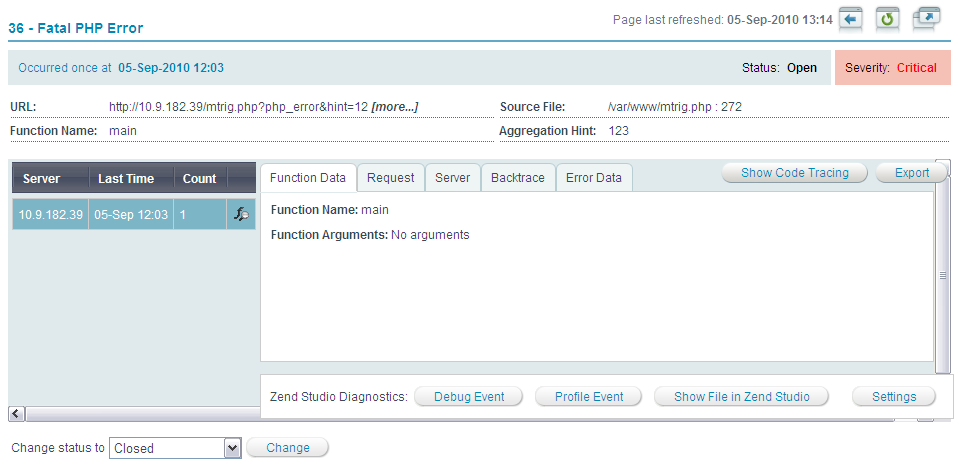Working with Aggregated Events
The Zend Server Cluster Manager Event Details page, is accessed from
Monitor | Events
by selecting an event from the list and clicking on the row.
Aggregated events are events that are collected from all the servers
that belong to the cluster. An event can occur on a single server or on
some or all servers. the events details page helps to identify the source
of the event and the server/s on which it happened.
The Event Details page is the main display area for aggregated information
regarding the occurrence of a specific type of event in your cluster.
Information on how an event is triggered is presented in .

Note:
Not all events display the same information. Only information
relevant to the specific event type will be shown.
The following actions can be performed from the Event Details page:
 Back to
Events - Returns to the Events
page.
Back to
Events - Returns to the Events
page. Refresh
- Refreshes the report. Refreshing the report updates the event counter
if the event occurred additional times.
Refresh
- Refreshes the report. Refreshing the report updates the event counter
if the event occurred additional times. Detach
- Opens the report in a new browser window.
Detach
- Opens the report in a new browser window.- Change Status - Changes
the status of the event displayed. For a complete explanation of event
handling, see .
On the Event Details page, users can view a general summary of an occurrence,
its status and diagnose the occurrence with Zend Studio for Eclipse.
Event Detail - Information
The following list describes the information types displayed in the
Event Details Page
Top Bar:
- Number of Occurrences -
The accumulated amount of times the event was triggered between the
first time the event occurred and the last time the event occurred.
Refreshing the report updates this number if the event occurred additional
times.
- Status - The status if
the event: Open, Closed, Reopened and Ignored. For a specific event,
the status can be changed in the Event Details page: For multiple
events, the status can be changed in the Events
page.
- Severity - The severity
of the event (Warning or Critical). The severity is defined in the
event's master settings in the Monitoring tab.
Event Details Table:
Events are aggregated into groups based on the time they occurred. The
aggregation is set to five minutes: Thus, all the events that occur within
that time frame are grouped together. Each time a set of events is aggregated
(i.e., a new group is created), the occurrence details are collected again.
To view the event occurrence details for a group, click on the group in
the Event Details table: The display on the right will change to display
the following options.
The Event Details Table options are:
Clicking on one of these options updates the display with the relevant
information.
Event Details
The Event Details are a collection of information relevant to the event
that occurred. Clicking on a time in the table on the left (Event Details
Table) will display the information relevant to the selected occurrence/es.
Through this you can find out for example, if a different function caused
the error or if a different message was thrown.
The following list presents the possible details that can be displayed
for a specific occurrence:
- Export - generates a file
containing the selected event's information.
- General Data - Displays
information about the event: The data changes according to the event
type.
- Function Data - Displays
information on the function that triggered the error, including the
function name and arguments.
- Request - Displays information
about the request. The superglobals (POST, GET and COOKIE) are always
displayed. The other parameters (RAWPOST and FILE) are displayed only
when there is relevant information to display.
- Server - Displays the superglobals
SERVER and ENV when there is relevant information.
- Session - Displays the
superglobal SESSION when there is relevant information.
- Backtrace - Displays all
the function calls that were made before the event was triggered,
including the relevant files for each function.
- Error Data - Displays the
PHP error and the Java backtrace if there was a Java exception.
- Custom Variables - Displays
information for a custom event (i.e., class and user-defined information
that was passed to the event when it was triggered).
- Job Queue - Job
Queue related events display the reason the Job generated
an event.
- Code Tracing - Code Tracing
related events display the reason that Code Tracing generated and
event.
- Zend Studio diagnostics
- Displays the actions can be applied to event details if Zend Studio
for Eclipse (ZSE) is installed and Zend Server
is configured to communicate with it:
- Debug Event - Initiates
a debug session for the event URL in ZSE.
- Profile Event - Profiles
the event URL, using the ZSE Profiler with the same parameters
(GET, POST, COOKIE, HTTP headers, etc.).
- Show File in Zend Studio
- Opens the file where the event occurred in Zend Studio. This
option makes it possible to use Zend Studio to edit files and
implement changes for multiple servers.
- Settings: through this
option you can choose to apply the Studio Integration actions to the
Originating Server (the server on which the event was triggered) or
to an Alternate Server (a different server running the same environment).Additional
configuration settings are set in Server Setup | Monitor.

